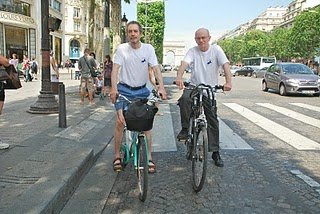Early last spring, I was forwarded an email from an American man living in Paris who wanted to somehow combine handicapping and bicycle riding to raise money for retired thoroughbred racehorses.
The man, Alan Kennedy, said he had a friend, Mark Cramer, an author and bicyle enthusiast who had published both handicapping books and novels and who wanted to try out some of his methods at French racetracks, which he would reach by bicycle. Kennedy was going to accomplany him.
At the time, I was the first vice president of the Thoroughbred Retirement Foundation. My principle occupation for them was fundraising, and since it was a rare day when someone showed up and asked if they could help you raise money, I quickly said, `yes, thank you.’
 |
| Kennedy and Cramer prepare for their journey in Paris |
So I said, “You know what would really be the thing? To ride this tour during the dates of the real Tour de France, from July 3 to July 25. You could go from track to track in 21 stages, just like the riders go from town to town. People could pledge money per mile, or just make general donations.” They clearly thought I was crazy, but were also intrigued by the challenge, and wanted to do some good.
We decided that they could blog about it as they rode, and I would link the blog to a personal fundraising page that I would promote in the TDN. Putting aside fears of heart attack, heat stroke and general breakdown, they agreed to do it.
The result of this journey (aside from the thousands of dollars he raised for the TRF and a similar organization in France, La Ligue Pour la Protection de Cheval) is Cramer’s fantastic new book, Handicapping On the Road: Two men, 65 and 59, bicycle 1,000 kilometers to 13 race tracks to save discarded Thoroughbreds, testing seven exciting betting methods along the way.
The book is divided into two sections; the first, on the handicapping methods he features, and the second on the travelogue aspect and real-life betting stories of the trip. (Spoiler: he paid for the entire trip with his winning bets.)
 |
| Mark at Longchamp |
 |
| The finish line at Compiegne |
In the meantime, I highly recommend Handicapping on the Road, available here:
http://www.altiplanopublications.com/ontheroad.htm



3 comments:
What renaissance men! It is great to hear about people with such great energy, intellect and kind hearts!
It is nice to see author Mark Cramer doing well overseas. I have the utmost respect for his teachings. So much in fact that I have taken up his search for the "automatic bet".
I followed their travels on The Riding For Their Lives blog last year. I was hoping they would continue blogging so a request they (Cramer and/or Kennedy) can restart that project.
As of their cause, it is noble and a wakeup call to the U.S. breeding industry which may create so many "unwanted" racehorses without taking the responsibility for bringing them into the world. The problem must be corrected at the very root - not in France.
I remember when this was happening last year and I'm interested in reading the book. What a great way to support a charity.
Post a Comment